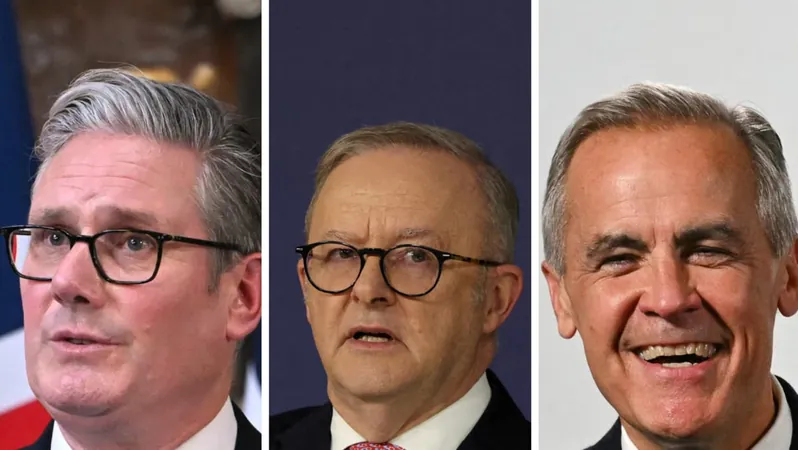
Historic Shift: Britain, Australia, and Canada Officially Recognize Palestinian State
2025-09-21
Author: Wei Ling
A Bold Move Amidst Conflict
In a groundbreaking announcement on September 21, Britain, Australia, and Canada declared their recognition of a Palestinian state. This decision, prompted by escalating tensions during the Gaza conflict, aims to advance the pursuit of a two-state solution, while potentially straining relations with Israel and the United States.
Joining a Global Consensus
These three nations join a growing coalition of approximately 140 countries supporting Palestinian aspirations for an independent state within the territories occupied by Israel. This recognition is especially significant for Britain, which played a pivotal role in establishing Israel post-World War II.
Keir Starmer's Stand for Peace
British Prime Minister Keir Starmer, through a post on X (formerly Twitter), emphasized the need for renewed hope in peace talks: "Today, we formally recognize the State of Palestine to revitalize the peace process for both Palestinians and Israelis." His stance marks a departure from U.S. President Donald Trump's position, as he had issued an ultimatum to Israel in July, insisting on specific actions to alleviate the dire situation in Gaza.
A Call for Change
Husam Zomlot, leader of the Palestinian Mission in London, hailed the recognition as a significant step toward justice and fulfillment of Britain's historical responsibilities. He articulated that this moment is not merely about Palestine, but about correcting past injustices.
Pressure Mounts Amid Rising Casualties
Far-reaching pressure on Starmer from British lawmakers arose due to the alarming rise in death tolls in Gaza. David Lammy, a prominent politician, noted that Israel's continued military activities and settlement expansions have diminished prospects for peace.
Backlash from Israel
In response, Israeli Prime Minister Benjamin Netanyahu vehemently opposed the recognition, accusing these nations of rewarding terrorism and expressing his commitment to never allowing a Palestinian state. Meanwhile, Israeli Security Minister Itamar Ben-Gvir intensified this rhetoric, labeling the move as a reward for "murderers."
Mixed Reactions on the Ground
In London, public reactions varied. Charity director Michael Angus emphasized the need for peace, suggesting this recognition is a first step toward acknowledging Palestinian rights. In contrast, some residents expressed concerns over perceived abandonment of Israel and potential support for Hamas.
A Historic Responsibility
The UK's recognition also evokes historical accountability, dating back to the 1917 Balfour Declaration, which promised the establishment of a Jewish homeland without infringing upon Arab rights. Experts argue that Britain owes Palestine more than just recognition, advocating for apologies and reparations for past injustices.
Implications of Recognition
The decision could lead to the Palestinian Mission in London being upgraded to embassy status, potentially instituting bans on products from Israeli settlements in occupied territories.
Looking Toward the Future
Palestinian Foreign Minister Varsen Aghabekian Shahin welcomed the recognition as a step closer to sovereignty and independence, while noting that it wouldn't immediately resolve the ongoing conflict.
Unified Call for Peace
Prime Ministers from Canada and Australia echoed sentiments for peace, urging a renewed commitment to a viable two-state solution. The statement made clear: Hamas must be excluded from any Palestinian governance.
Next Steps for Israel?
In a counteraction, Israeli minister Ben-Gvir is expected to propose annexing parts of the West Bank, further complicating the already tense situation.



 Brasil (PT)
Brasil (PT)
 Canada (EN)
Canada (EN)
 Chile (ES)
Chile (ES)
 Česko (CS)
Česko (CS)
 대한민국 (KO)
대한민국 (KO)
 España (ES)
España (ES)
 France (FR)
France (FR)
 Hong Kong (EN)
Hong Kong (EN)
 Italia (IT)
Italia (IT)
 日本 (JA)
日本 (JA)
 Magyarország (HU)
Magyarország (HU)
 Norge (NO)
Norge (NO)
 Polska (PL)
Polska (PL)
 Schweiz (DE)
Schweiz (DE)
 Singapore (EN)
Singapore (EN)
 Sverige (SV)
Sverige (SV)
 Suomi (FI)
Suomi (FI)
 Türkiye (TR)
Türkiye (TR)
 الإمارات العربية المتحدة (AR)
الإمارات العربية المتحدة (AR)